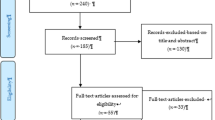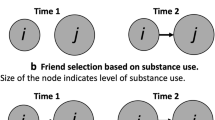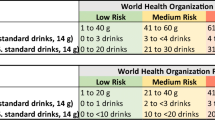Abstract
Rationale
Alcohol dependence is known to be associated with steep discounting of delayed rewards, but its relation to the discounting of delayed losses and probabilistic rewards is unclear. Moreover, patterns of alcohol consumption vary considerably between communities, but previous research has not examined the relation between discounting and alcohol dependence in low-income African Americans.
Objectives
The goal of the present study was to determine whether low-income, alcohol-dependent African Americans differ from controls in the degree to which they discount delayed rewards, delayed losses, or probabilistic rewards.
Methods
African–American participants, both cases and controls, were recruited from the same low-income neighborhoods, and propensity-score matching was used to further control for demographic differences. Participants performed three tasks that assessed their discounting of hypothetical monetary outcomes: delayed rewards, delayed losses, and probabilistic rewards.
Results
Alcohol-dependent cases discounted delayed gains, but not delayed losses or probabilistic gains, more steeply than their matched controls. The difference in discounting of delayed gains was localized to the male cases, whose discounting was steeper than either the male controls or the female cases; no gender difference was observed between male and female controls.
Conclusions
The present results extend findings regarding discounting by substance abusers to a previously unstudied group, low-income African Americans, and suggest that in this group at least, alcohol dependence, particularly in males, may be more a reflection of choosing immediate rewards than of ignoring their delayed negative consequences.


Similar content being viewed by others
References
Anthony JC, Echeagaray-Wagner F (2000) Epidemiologic analysis of alcohol and tobacco use. Alcohol Res Health 24:201–208
Apel RJ, Sweeten G (2010) Propensity score matching in criminology and criminal justice. In: Weisburd D, Piquero AR (eds) Handbook of quantitative criminology. Springer, New York, pp 543–562
Audrian-McGovern J, Rodriguez D, Epstein LH, Cuevas J, Rodgers K, Wileyto EP (2009) Does delay discounting play an etiological role in smoking or is it a consequence of smoking? Drug Alcohol Depend 103:99–106
Becker SO, Ichino A (2002) Estimation of average treatment effects based on propensity scores. Stata J 2:358–377
Becker JB, Perry AN, Westernbroek C (2012) Sex differences in the neural mechanisms mediating addiction: a new synthesis and hypothesis. Biol Sex Differ 3:1–35
Bickel WK, Marsch LA (2001) Toward a behavioral economic understanding of drug dependence: delay discounting processes. Addiction 96:73–86
Bickel WK, Johnson MW, Koffarnus MN, MacKillop J, Murphy JG (2014a) The behavioral economics of substance use disorders: reinforcement pathologies and their repair. Annu Rev Clin Psychol 10:641–677
Bickel WK, Koffarnus MN, Moody L, Wilson AG (2014b) The behavioral- and neuro-economics process of temporal discounting: a candidate behavioral marker of addiction. Neuropharmacology 76:518–527
Bobova L, Finn PR, Rickert ME, Lucas J (2009) Disinhibitory psychopathology and delay discounting in alcohol dependence: personality and cognitive correlates. Exp Clin Psychopharmacol 17:51–61
Bouchery EE, Harwood HJ, Sacks JJ, Simon CJ, Brewer RD (2011) Economic costs of excessive alcohol consumption in the US, 2006. Am J Prev Med 41:516–524
Caetano R, Clark CL (1998) Trends in alcohol-related problems among whites, blacks, and Hispanics. 1984–1995. Alcohol Clin Exp Res 22:534–538
Cotto JH, Davis E, Dowling GJ, Elcano JC, Staton AB, Weiss SR (2010) Gender effects on drug use, abuse, and dependence: a special analysis of results from the National Survey on Drug Use and Health. Gend Med 7:402–413
de Wit H, Flory JD, Acheson A, McCloskey M, Manuck SB (2007) IQ and nonplanning impulsivity are independently associated with delay discounting in middle-aged adults. Personal Individ Differ 42:111–121
Dennhardt AA, Murphy JG (2011) Associations between depression, distress tolerance, delay discounting, and alcohol-related problems in European American and African American college students. Psychol Addict Behav 25:595–605
Du W, Green L, Myerson J (2002) Cross-cultural comparisons of discounting delayed and probabilistic rewards. Psychol Rec 52:479–492
Estle SJ, Green L, Myerson J, Holt DD (2006) Differential effects of amount on temporal and probability discounting of gains and losses. Mem Cogn 34:914–928
Fesahazion RG, Thorpe RJ, Bell CN, LaVeist TA (2012) Disparities in alcohol use: does race matter as much as place? Prev Med 55:482–484
Ford BC, Bullard KM, Taylor RJ, Toler AK, Neighbors HW, Jackson JS (2007) Lifetime and 12-month prevalence of Diagnostic and Statistical Manual of Mental Disorders, Fourth Edition disorders among older African Americans: findings from the National Survey of American Life. Am J Geriatr Psychiatr 15:652–659
Gissler M, Hemminki E (1996) The danger of overmatching in studies of the perinatal mortality and birthweight of infants born after assisted conception. Eur J Obstet Gynecol Reprod Biol 69:73–75
Glynn RJ, Schneeweiss S, Sturmer T (2006) Indications for propensity scores and review of their use in pharmacoepidemiology. Basic Clin Pharmacol Toxicol 98:253–259
Green L, Myerson J (2004) A discounting framework for choice with delayed and probabilistic rewards. Psychol Bull 130:769–792
Green L, Myerson J (2013) How many impulsivities? A discounting perspective. J Exp Anal Behav 99:3–13
Green L, Myerson J, Lichtman D, Rosen S, Fry A (1996) Temporal discounting in choice between delayed rewards: the role of age and income. Psychol Aging 11:79–84
Green L, Myerson J, Oliveira L, Chang SE (2013) Delay discounting of monetary rewards over a wide range of amounts. J Exp Anal Behav 100:269–281
Haushofer J, Fehr E (2014) On the psychology of poverty. Science 344:862–867
Hesselbrock MN, Hesselbrock VM, Segal B, Schuckit MA, Bucholz K (2003) Ethnicity and psychiatric comorbidity among alcohol-dependent persons who receive inpatient treatment: African Americans, Alaska natives, Caucasians, and Hispanics. Alcohol Clin Exp Res 27:1368–1373
Holm S (1979) A simple sequentially rejective multiple test procedure. Scand Stat Theory Appl 6:65–70
Johnson MW, Bickel WK (2008) An algorithm for identifying nonsystematic delay-discounting data. Exp Clin Psychopharmacol 16:264–274
Kirby KN, Finch JC (2010) The hierarchical structure of self-reported impulsivity. Personal Individ Differ 48:704–713
LaVeist TA, Wallace JM (2000) Health risk and inequitable distribution of liquor stores in African American neighborhood. Soc Sci Med 51:613–617
Lejuez CW, Magidson JF, Mitchell SH, Sinha R, Stevens MC, de Wit H (2010) Behavioral and biological indicators of impulsivity in the development of alcohol use, problems, and disorders. Alcohol Clin Exp Res 34:1334–1345
MacKillop J, Kahler CW (2009) Delayed reward discounting predicts treatment response for heavy drinkers receiving smoking cessation treatment. Drug Alcohol Depend 104:197–203
MacKillop J, Amlung MT, Few LR, Ray LA, Sweet LH, Munafò MR (2011) Delayed reward discounting and addictive behavior: a meta-analysis. Psychopharmacology 216:305–321
Marsh JL, Hutton JL, Binks K (2002) Removal of radiation dose response effects: an example of over-matching. Br Med J 325:327–330
Martin JK, Tuch SA, Roman PM (2003) Problem drinking patterns among African Americans: the impacts of reports of discrimination, perceptions of prejudice, and “ risky” coping strategies. J Health Soc Behav 44:408–425
Midanik LT, Tam TW, Weisner C (2007) Concurrent and simultaneous drug and alcohol use: results of the 2000 National Alcohol Survey. Drug Alcohol Depend 90:72–80
Mullahy J, Sindelar JL (1998) Drinking, problem drinking, and productivity. In: Galanter M (ed) Recent developments in alcoholism, volume 14: the consequences of alcoholism. Plenum Press, New York, pp 347–359
Murphy JG, Vuchinich RE, Simpson CA (2011) Delayed reward and cost discounting. Psychol Rec 51:571–578
Myerson J, Green L (1995) Discounting of delayed rewards: models of individual choice. J Exp Anal Behav 64:263–276
Myerson J, Green L, Warusawitharana M (2001) Area under the curve as a measure of discounting. J Exp Anal Behav 76:235–243
Myerson J, Green L, Hanson JS, Holt DD, Estle SJ (2003) Discounting delayed and probabilistic rewards: processes and traits. J Econ Psychol 24:619–635
Myerson J, Green L, Morris J (2011) Modeling the effect of reward amount on probability discounting. J Exp Anal Behav 95:175–187
Petry NM, Stinson FS, Grant BF (2005) Comorbidity of DSM-IV pathological gambling and other psychiatric disorders: results from the National Epidemiologic Survey on Alcohol and Related Conditions. J Clin Psychiatr 66:564–574
Rachlin H (2006) Notes on discounting. J Exp Anal Behav 85:425–435
Rachlin H, Raineri A, Cross D (1991) Subjective probability and delay. J Exp Anal Behav 55:233–244
Reimers S, Maylor EA, Stewart N, Chater N (2009) Associations between a one-shot delay discounting measure and age, income, education and real-world impulsive behavior. Personal Individ Differ 47:973–978
Rosenbaum PR (2002) Observational studies, 2nd edn. Springer, New York
Rosenbaum PR, Rubin DB (1983) The central role of the propensity score in observational studies for causal effects. Biometrika 70:41–55
Rossow I (2008) Alcohol consumption and discounting. Addict Res Theory 16:572–584
Takahashi T, Ohmura Y, Oono H, Radford M (2009) Alcohol use and discounting of delayed and probabilistic gain and loss. Neuro Endocrinol Lett 30:479
Thaler RH (1981) Some empirical evidence on dynamic inconsistency. Econ Lett 8:201–207
Washio Y, Higgins ST, Heil SH, McKerchar TL, Badger GJ, Skelly JM, Dantona RL (2011) Delay discounting is associated with treatment response among cocaine-dependent outpatients. Exp Clin Psychopharmacol 19:243–248
Weafer J, De Arcangelis J, de Wit H (2015) Sex differences in behavioral impulsivity in at-risk and non-risk drinkers. Front Psychiatr 6:72
Woolverton WL, Freeman KB, Myerson J, Green L (2012) Suppression of cocaine self-administration in monkeys: effects of delayed punishment. Psychopharmacology 220:509–517
Yi R, Mitchell SH, Bickel WK (2010) Delay discounting and substance abuse-dependence. In: Madden GJ, Bickel WK (eds) Impulsivity: the behavioral and neurological science of discounting. American Psychological Association, Washington, D.C
Yoon JH, Stephen T, Heil SH, Sugarbaker RJ, Thomas CS, Badger GJ (2007) Delay discounting predicts postpartum relapse to cigarette smoking among pregnant women. Exp Clin Psychopharmacol 15:176–186
Zapolski TC, Pedersen SL, McCarthy DM, Smith GT (2014) Less drinking, yet more problems: understanding African American drinking and related problems. Psychol Bull 140:188–223
Conflict of Interest
The authors have no financial relationship or conflict of interest to declare.
Funding
Funding for the research was provided by NIH grants R01AA017444, T32DA007313 and DA031288.
Author information
Authors and Affiliations
Corresponding author
Rights and permissions
About this article
Cite this article
Myerson, J., Green, L., van den Berk-Clark, C. et al. Male, But Not Female, Alcohol-Dependent African Americans Discount Delayed Gains More Steeply than Propensity-Score Matched Controls. Psychopharmacology 232, 4493–4503 (2015). https://doi.org/10.1007/s00213-015-4076-x
Received:
Accepted:
Published:
Issue Date:
DOI: https://doi.org/10.1007/s00213-015-4076-x




